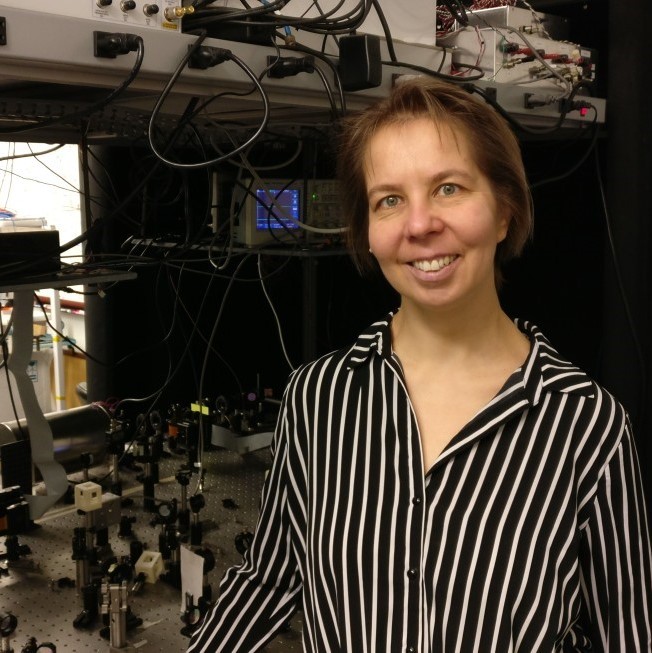Irina Novikova
College of William and Mary, USAFor outstanding research of quantum coherence phenomena in atomic vapors, and ongoing service to OSA and the optics community.

Even from a young age growing up in Russia, Irina Novikova has been interested in the more analytical subjects, like physics and math. Her father was a physicist, so science was always a part of her life. Despite the early interest, her path was not so apparent. The Russian economic climate at the time made many people doubt the importance of scientific research, and they told her it was a “dead-end career.” She was also being encouraged to pursue music because she studied cello rather seriously as a child. However, with the support of her mother she continued her studies in physics, getting an undergraduate degree from Moscow Engineering Physics Institute and moving to the United States in 1998 to pursue her doctoral work at Texas A&M.
Of course, she had other support as well. Mentors have played an important role in her life and career. In particular, her undergraduate and PhD research advisors were supportive, and she reflects that they never condescended to her because she was a woman. For Irina, mentors were never formal, and she found support and guidance from peers as well: “You just meet people, and sometimes, even, after the fact you realize how important their influence on your life was.” The society has played a crucial role in her career for this very reason. The first big conference she attended was OSA’s annual meeting in Long Beach in October 2001. She remembers being immediately struck by how the society was able to facilitate networking among members right from the beginning. About OSA she comments, “it lifts you to the next level. [You are] not just one scientist in the lab, but you can contribute in other ways. I’ve met wonderful people through various service appointments…I’m a lifetime member now, and OSA is my society.”
As a researcher, she is always excited about whatever work she is doing at the time. Today, her work is beginning to move in a new and exciting direction. Until now, her group mostly explored the optical measurement using a laser beam as a whole. Now, they suspect there is much more useful information if they are able to look at the quantum behavior with good spatial resolution. It is like having a photograph instead of just one bright or dim spot. She says the work is challenging, and they discover new things every day. Her favorite part of the research process is a very special moment when everything “snaps together,” and results, expected or not, reveal themselves. The preparation work and the writing of the paper are both fun in their own way, but the moment when the results materialize is the most special for her.
Mistakes happen to all of us. For Irina, one of her favorite discoveries revolves around one. She was working in the lab on a new light storage experiment – taking the pulse of light and attempting to preserve it in the atomic medium. She spent weeks as a postdoc getting so close to the desired result but always coming up just shy. What could possibly be wrong? Turns out, it was just an analytical mistake, eventually discovered by a colleague, and everything was actually working perfectly the whole time. For her collaborator and herself, it was a cool moment, where everything finally came together and worked.
Truly passionate about the field, Irina is excited about the future of quantum optics. She comments, “We are approaching the limit where you can use the knowledge of quantum mechanics to construct new things,” and she is really looking forward to the future. She believes that there will be unexpected applications coming our way as technology catches up with the knowledge we have now.
She advises young researchers to stay curious. Irina thinks curiosity is the most important thing for any science. “You really have to love to solve nature’s puzzle or human’s puzzle. You have to be able to sacrifice your time and effort and energy to doing that and you really have to enjoy the process.” She adds “make friends,” to her advice and says it’s a misconception in the general public that scientists are loners: “We still have to spend a lot of time in the lab-we still have to work hard, but I think the most exciting things happen when we talk to other people…new knowledge emerges.”
Profile written by Samantha Hornback
